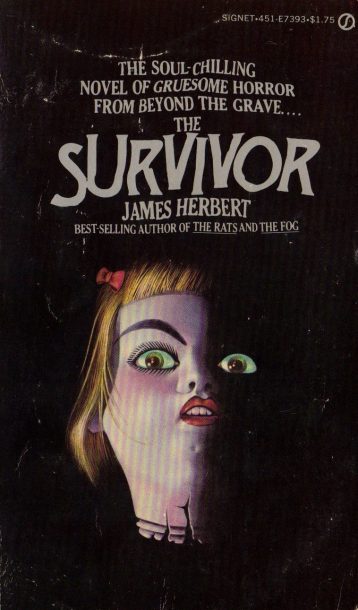 By JAMES HERBERT (Signet; 1976/77)
By JAMES HERBERT (Signet; 1976/77)
The third novel by the UK’s late James Herbert, this was initially billed as a departure from its predecessors, the pioneering splat fests THE RATS and THE FOG. In truth THE SURVIVOR is very much like those earlier books in its structure, which depends heavily upon characters being introduced at the beginning of a chapter and horribly killed at its end. This, of course, was the model for the so-called “nasties” brand of horror novels that proliferated in the wake of THE RATS, and it’s certainly not the only template set by Herbert. THE SURVIVOR can also be said to foreshadow both the FINAL DESTINATION franchise and THE SIXTH SENSE in its well-constructed narrative, which pivots on a man who miraculously walks away from a plane crash.
Keller, the plane’s co-pilot, is the sole survivor of the disaster. He comes to believe that he’s been spared for some reason, which appears to be confirmed by Hobbs, a spiritualist who urgently tracks him down. Hobbs claims that the spirits of those who died in the crash are amassing around Hobbs and calling his name, but can’t articulate what it is they want, as apparently “after an accident of this nature, the spirits sometimes do not realize what has happened to them; they are in a state of emotional shock. They do not know they are dead!” As I said, THE SIXTH SENSE is anticipated here (the line “I see dead people” is nowhere to be found, but the film’s narrative arc is directly foreshadowed).
In addition to Keller’s drama we get, as mentioned above, assorted chapters about various not-long-for-this-world residents of the town where the plane crashed. They include a young couple, a fisherman, a troubled priest, a murderous housefrow and an obese pre-teen, all of whom are terrorized and eventually dispatched by a retinue of ghosts whose ranks include an eyeless man, a little girl and her doll—all of whom were killed in the crash (except the doll, which appears to have been given the opposite treatment).
The nexus of all this is Keller, who while trying to figure out why he’s so popular with the undead takes it upon himself to investigate the particulars of the plane crash. A bomb appears to have done the job, but who smuggled it onboard, and why?
All is answered in the twist ending, which may not seem nearly as surprising as it once did but still packs a punch. As for the novel overall, it’s vintage James Herbert: smoothly written and unapologetically pulpy, with a narrative that adroitly encompasses espionage and the supernatural, not to mention a goodly amount of in-your-face grue.
